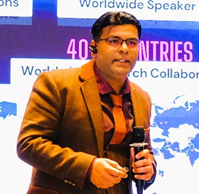Keynote Speaker

Prof. Saim Memon
CEO & Industrial Professor of Renewable Energy Engineering, Sanyou London Pvt Ltd, UK;Department for Engineering, School of Engineering and the Built Environment, Birmingham City University, UK
Speech Title: Modern Mass-Produced Vacuum Insulation Technologies for Energy-Efficient and Sustainable Building Retrofits and Temperature-Sensitive Transportation Applications
Abstract: Achieving the United Nations Sustainable Development Goals (SDGs) requires transforming academic research into scalable products that reduce energy consumption and associated carbon emissions. This keynote introduces modern, mass-produced vacuum insulation technologies aimed at addressing energy efficiency in buildings and temperature-sensitive transportation sectors. The Vacuum Insulated Wallpaper (VIW), an ultra-thin, cost-effective solution, provides high-performance insulation with a thickness of 4 mm and thermal conductivity below 5 mW/m·K, enhancing energy efficiency in hot-arid and cold-arid climates. Vacuum Insulation Panels (VIPs), made from fiberglass or fumed silica, deliver exceptional thermal performance with conductivity as low as 2.5 mW/m·K at 15 mm thickness and 4.5 mW/m·K at 25 mm thickness, offering superior insulation in extreme climates with less space compared to traditional materials. The decorative integrated VIP (MCM and Metal) offers fire-resistant and weather-proof external insulation, achieving conductivity below 7 mW/m·K at 30 mm thickness, leading to up to 22% energy savings and significant reductions in noise and temperature rise. Beyond buildings, the Vacuum Insulated Bag-or-Box (VIBB) system incorporates flexible VIPs and polyurethane (PU) to maintain internal temperatures without external cooling, crucial for cold chain logistics and the transportation of temperature-sensitive pharmaceuticals, chemicals, and food products. VIBB systems are tailored to specific applications, including the Medical Box, Deep Cold Box, Rolling Cart Cover, and Fresh Bag, each designed to meet diverse temperature control needs. These innovations collectively contribute to global sustainability efforts by improving energy efficiency, reducing carbon footprints, and ensuring safe, efficient transport across various industries.
Biography: Prof. Dr. Saim Memon, CEO and Industrial Professor of Renewable Energy Engineering, unifies academic research and development, industrial manufacturing, and product distribution in the global market. Prof. Saim ranked in the top 0.96% worldwide in the field of Energy and the Top 0.86% overall among all scholars worldwide over the past 5 years (ScholarGPS) as a result of extensive academic and research contributions that includes 120+ research publications, 41 taught modules (with module leadership) in electrical, electronic, mechanical, and renewable energy engineering with over 90% student satisfaction, along with successful supervision of 2+ PhD projects, 12+ MSc/MEng projects, and 23+ BEng (Hons) projects. He has held 50+ invited/keynote speakerships, engaged in research collaborations with 40+ countries worldwide, accumulated 1600+ citations with a 23+ h-index and a 52+ i10-index, served in 5+ editor-in-chief and guest editorships, and fulfilled 40+ journal reviewer roles. Prof. Saim has also demonstrated his academic leadership and made significant contributions to lead research group and MSc/MEng/BEng (Hons) courses directorship and degree apprenticeships with development and validation. Prof Saim built his academic research career in the UK, earned PhD in Mechanical, Electrical & Manufacturing Engineering; PGCert in Teaching Qualification; MSc in Mechatronics; and BEng (Hons) in Electrical Engineering (1st Class Distinction). Prof Saim is also a Chartered Engineer and a Fellow of Higher Education Academy, holding Qualified Teacher Status granted by General Teaching Council for Scotland in the UK. Prof. Saim has world-leading multidisciplinary research expertise in Electrical, Mechanical, and Renewable Energy Engineering. His specific research experiences encompass net-zero energy buildings, vacuum insulation, thermal management of electric vehicle batteries, translucent vacuum insulation panels, energy materials for vacuum insulated smart windows, vacuum-based photovoltaic solar thermal collectors, applied semi-transparent photovoltaics and switchable films, renewable energy technologies, thermoelectric devices for energy harvesting and smart grid integration into electric vehicles with fast-charging battery mechanisms.
